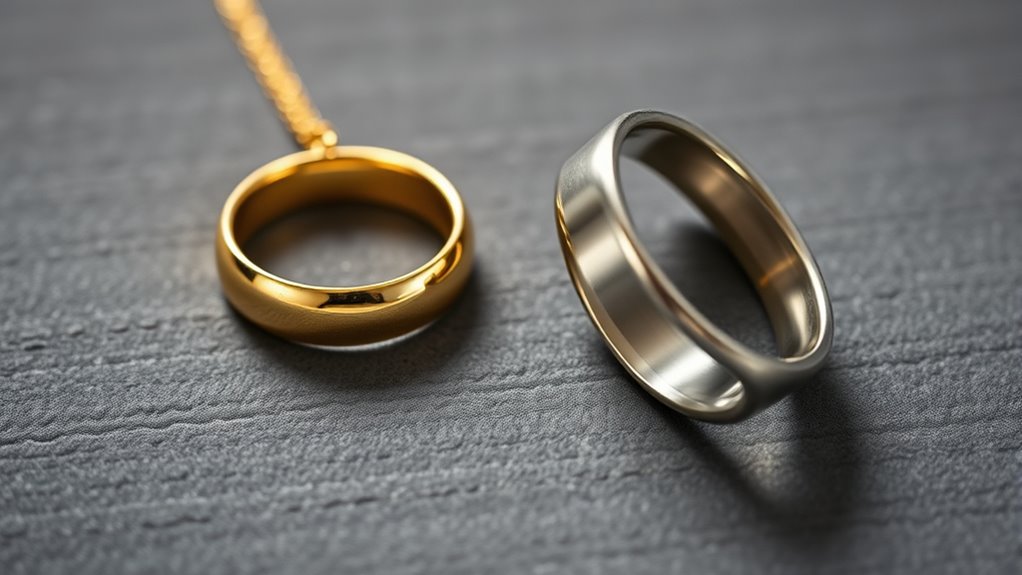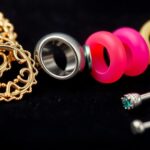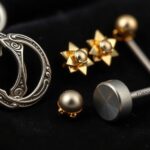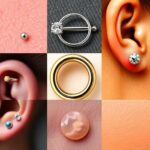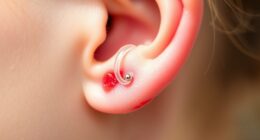When choosing between 24-karat gold and surgical steel, prioritize skin safety and durability. 24-karat gold is pure and hypoallergenic, making it gentle on sensitive skin, but it’s softer. Surgical steel is also hypoallergenic, highly durable, and resists tarnishing, making it ideal for daily wear. By understanding their benefits, you can pick metals that truly love your skin. Keep exploring to learn how to make the best choice for you.
Key Takeaways
- Surgical steel is hypoallergenic and highly resistant to tarnish, making it excellent for sensitive skin and daily wear.
- 24-karat gold is pure and less likely to cause allergies but is softer and may require careful handling.
- Avoid jewelry containing nickel or alloys that can trigger skin irritation, favoring high-quality surgical steel or pure gold.
- Durable metals like surgical steel and solid gold resist corrosion, ensuring long-lasting, skin-friendly jewelry.
- Understanding metal composition helps you choose safe, hypoallergenic options suited for sensitive skin.
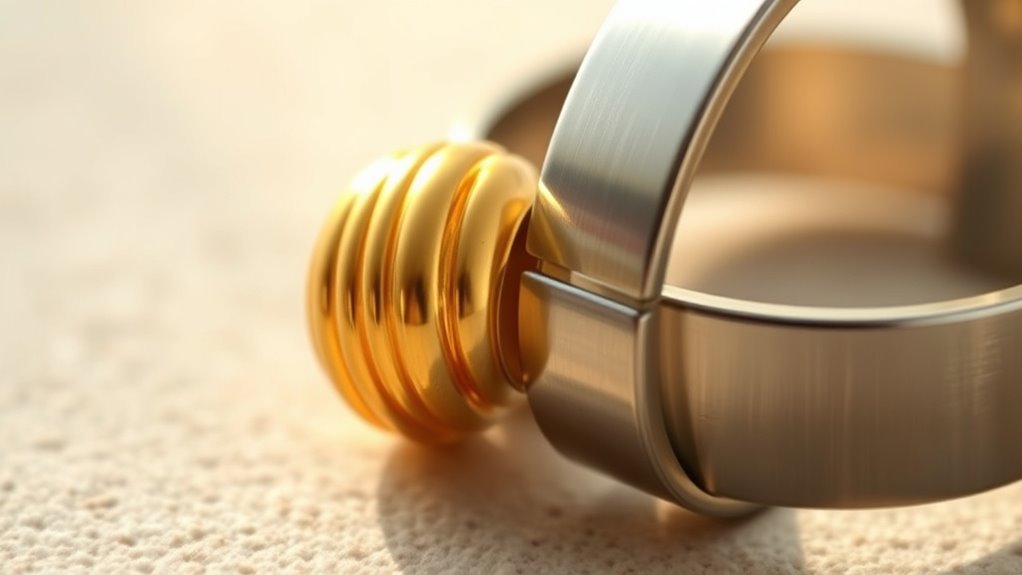
Metals can be your skin’s best friends when chosen wisely, offering benefits that go beyond mere aesthetics. When selecting jewelry or accessories, it’s essential to consider how metals interact with your skin, especially if you have sensitive skin or are prone to allergies. Some metals are more likely to be allergy triggers, causing irritation, redness, or discomfort. Knowing which metals are less reactive can save you from unwanted skin reactions and long-term irritation. Additionally, metal durability plays a vital role in how well your jewelry will hold up over time. A metal that’s durable resists tarnishing, bending, or breaking, ensuring your investment lasts and maintains its appearance. When you opt for metals that balance both allergy safety and durability, you’re making a smart choice for your skin and your wallet.
Choosing metals like surgical steel or 24-karat gold can considerably reduce allergy triggers. Surgical steel, often used in medical implants, is crafted to be hypoallergenic, meaning it’s less likely to cause reactions. Its high durability also means it withstands daily wear without tarnishing or losing its shine. This makes it an excellent choice if you’re looking for jewelry that’s both safe and long-lasting. On the other hand, 24-karat gold is pure, so it contains fewer alloys that could cause allergy triggers. Its softness, however, makes it less durable for everyday wear unless set in a sturdy design. Despite its softness, 24-karat gold’s hypoallergenic qualities make it suitable for those with sensitive skin, especially if you’re willing to take extra care to prevent scratches and dents.
While some metals like nickel and certain alloys are common in jewelry, they’re infamous for allergy triggers. Nickel, in particular, is a common allergen, often embedded in cheaper jewelry, causing contact dermatitis. If you’re sensitive, avoiding nickel-laden pieces is wise. Instead, opt for metals labeled as nickel-free or hypoallergenic. Metal durability varies widely; some alloys might look appealing initially but tarnish quickly or degrade, leading to skin irritation or the need for frequent replacements. That’s why investing in high-quality materials like surgical steel or solid gold pays off — they’re designed to endure daily wear and resist corrosion or tarnish, preserving both your jewelry’s appearance and your skin’s health.
Furthermore, understanding the different types of metals used in jewelry can help you make more informed choices tailored to your skin’s needs. When you make informed choices, you’re not just investing in jewelry; you’re protecting your skin and enjoying pieces that truly stand the test of time.
Frequently Asked Questions
How Do I Identify Genuine 24-Karat Gold Jewelry?
To identify genuine 24-karat gold jewelry, check its gold purity and look for hallmark symbols. Pure 24-karat gold should have a hallmark like “999” or “24K” stamped somewhere on the piece, indicating its high purity. Also, examine the jewelry for a consistent color and weight—real gold feels dense and rich. Be cautious of discoloration or signs of plating, as these suggest lower-quality or fake gold.
Can Surgical Steel Cause Allergic Reactions Over Time?
Imagine a tiny metal fortress nestled against your skin, but over time, some alloys like surgical steel can cause a metal allergy or skin sensitivity. While generally hypoallergenic, prolonged exposure or certain sensitivities might lead to irritation or rash. If you notice redness or itching, it’s wise to remove the jewelry. Everyone’s skin reacts differently, so paying attention helps you choose metals that keep your skin happy and healthy.
Are There Any Metals Safer for Sensitive Skin Besides Gold and Steel?
If you have nickel allergies or sensitive skin, look for hypoallergenic metals like titanium, platinum, or niobium. These metals are less likely to cause reactions and are safe choices beyond gold and steel. You should always check labels or ask jewelers about the materials used. Choosing jewelry made from hypoallergenic metals assists in preventing irritation and ensures comfort, so you can wear your pieces confidently without worries.
How Does the Price of 24-Karat Gold Compare to Surgical Steel?
When comparing the price of 24-karat gold to surgical steel, you’ll notice a big difference. Gold investment and jewelry value make 24-karat gold markedly more expensive because of its purity and rarity. Surgical steel, on the other hand, offers affordability and durability. If you want a luxurious, timeless look and are willing to pay for quality, gold costs more. If you seek affordability and practicality, surgical steel’s the better choice.
Do Different Types of Surgical Steel Vary in Skin Safety?
You might wonder if different types of surgical steel vary in skin safety. Yes, they do. Their metal composition affects hypoallergenic properties, so some steel types contain fewer irritants like nickel. For sensitive skin, look for implants labeled as 316L or medical-grade stainless steel, which are designed to be more biocompatible. Selecting the right surgical steel guarantees your jewelry or implants are safer and less likely to cause allergic reactions.
Conclusion
So, next time you’re debating between 24-karat gold and surgical steel, remember: your skin isn’t just a pretty canvas—it’s also a picky diva. Choose wisely, or you might end up with more than just a fashion statement—like a rash or irritation. After all, who knew that in the battle of metals, your skin’s comfort is the real prize? Spoiler alert: it’s not always the shiniest one that wins. Take care of your skin; it’s the real jewelry.

